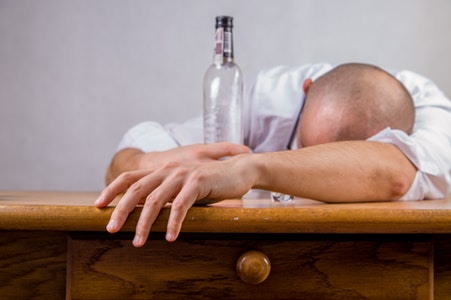Did you know that overweight and alcohol are directly related to snoring?
That’s right, obesity causes the airways to narrow, so the air vibrates and sounds very loud.
Also, you are more likely to snore when you sleep in a state close to unconsciousness, some
 thing that alcohol has a lot to do.
thing that alcohol has a lot to do.
To avoid snoring, it is a good idea to lose weight and avoid alcohol and sleeping pills, but there are other tricks, one is always to sleep sideways and never face up.
To avoid turning on your back during the night, you can use a tennis ball between your end and pajamas, which forces you to be on your side, so you do not feel it.
There are also some patches that are used on the nose and regulate breathing, but they do not work in case of sleep apnea.
Do you know that there is a connection between obstructive sleep apnea and alcohol consumption?
Do you know that there is a connection between obstructive sleep apnea and alcohol consumption? So that’s it. Even occasional drinkers may experience apnea. Sometimes when we can not fall asleep, we tend to have a drink, but how does alcohol affect sleep and snoring? Alcohol efficiently helps rest to sleep, but drinking has been shown to cause reduced sleep, nighttime sleep interruptions (fragmented sleep), and decreased REM sleep time.
It seems likely that the properties of alcohol as a depressant reduce brain activity that activated in the REM phase. Alcohol inhibits the entry of the neurotransmitter glutamate to the NMDA receptors (one of the glutamate brain receptors) with glutamate being the central neurotransmitter stimulant, which gives a partial explanation of the effect of alcohol on the general activity of the brain. Also, disruption of breathing during sleep is made worse by alcohol.
Alcohol prevents breathing during sleep, since the throat muscles relax, and affect the brain’s center of respiration by masking the effect of a low level of oxygen in the blood. Even people who habitually do not snore can do it if they have been drinking. Also, snorers who do not suffer from apnea may show symptoms because of alcohol intake.
The effects of the hangover, the body’s effort to metabolize alcohol, may be caused, in part, by disturbed breathing during sleep.
How can I prevent snoring?
If snoring occurs only after drinking alcohol, then the solution is quite simple. An anti-snore spray can be useful in these cases. With these types of sprays, make sure the product applied in the right place. Often, the product ends up in the mouth and not in the throat. This minimizes its effect. If you want to make sure that the spray produces all its effect uses a spray with a special nozzle that atomizes the substance directly into the throat cavity.
Nasal irritation
In addition to the above factors, alcohol is known to irritate the nasal airways, as well as congestion that creates the resistance of the airways when breathing. If for some reason you can not stop drinking, one way to reduce the effects of alcohol on your sleep patterns would be to make sure you drink the last drink at least 4 hours before going to bed. This grace period allows the body the opportunity to process alcohol and reduce the effects it may have on your sleep, helps you sleep without snoring.
In addition to alcohol that causes problems with sleep disorders, it is also important to be careful when taking sedatives such as sleeping pills. They behave almost in the same way as alcohol, causing the body to relax muscles and produce many of the same symptoms.
